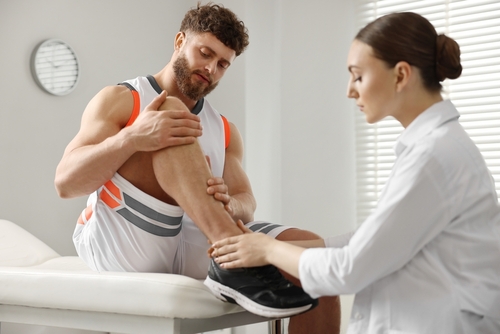Beyond The Game: The Psychological Toll Of Sports Injuries On Athletes

In sports, the question isn’t if an athlete will get injured, but when. In many professional sporting environments, there’s a large emphasis on physical training and preparation, including strength and conditioning, physical therapy, massage, etc. Just as athletes train physically to stay healthy and strong, there is also a growing focus on mental training. Through developing strong coping skills, resilience, and a positive mindset, athletes can strengthen these protective psychological factors that can improve their response to injury.
Prevention and Preparation:
In my experience, we can look at this in two separate phases: prevention and treatment. In the preventative phase, the focus is on skill-building before an athlete gets injured. How can you work with a physically healthy athlete to grow and develop their mental skills toolkit to strengthen their mindset and be better prepared to face an injury? This can involve mental skills training and even psychotherapy.
Rehabilitation and Recovery:
The second phase is post-injury rehabilitation. When an athlete is injured and unable to return to their sport for a certain period, depending on the severity of the injury, there must be protocols in place in a team environment to support athletes during this time. Supporting the player from a physical and psychological perspective is essential for a successful return to play.
Psychological Readiness to Return to Sport:
Fear of reinjury is the leading psychological reason for failing to return to competitive sports.1,2 Other common psychological factors that impede an athlete’s ability to return to their sport include loss of interest, lack of confidence, and depression. This is called the psychological readiness to return to sport. 1 There are 3 key aspects of psychological readiness to return to sport: confidence in returning to sport, realistic expectations of capability, and motivation to regain pre-injury performance standards.3
Organizational Support: IMG Academy’s Approach
Looking at this from the lens of organizational programming, IMG Academy, a school that supports the entire student-athletes’ developmental journey, has developed an Injured Athlete Program to help its students. If an athlete has incurred an injury that requires over 30 days of rehabilitation, they will automatically enter this program. “Part of the return to play protocol is getting a recommendation from the mental performance coach that they’re ready to return from a psychological point of view,” says Duncan Simpson, Ph.D., CMPC, Director of Personal Development at IMG Academy. The student-athletes in this program will work with a mental performance coach weekly for the duration of their rehabilitation. Through this multidisciplinary approach, the student-athletes are well-supported from both a physical and psychological perspective throughout their recovery.
Athletes’ Perspectives:
Athletes offer a unique perspective when discussing injuries. Louie Vito, a professional snowboarder and an Olympian, suffered a severe back injury at his first event in the 2018 Olympics, which prompted him to take some time off. He attributes his positive mindset after his injury to the years of mental skills building and resilience he had developed over time. His perspective on recovery was thinking “I need to attack this rehab like I attack learning a new trick,” says Vito. Over time, he developed a strong pre-competition routine that allowed him to strengthen his mental preparation. When feeling nervous or excited, he would remind himself, “Everyone always has butterflies but fly them in formation—control them to your benefit,” describes Vito. One could argue that he was able to return to his sport with exceptional skill because of the strong mental skills he had built, well before his most severe injuries.
The Role of Coaches:
Coaches can have a significant impact on an athlete’s psychological readiness to return to their sport after injury. Valorie Kondos-Field, head coach of the seven-time NCAA Champion UCLA Women’s Gymnastics Team from 1991-2019, describes that a coach’s role should be to “help you do something you can’t do on your own and set the plan on how to achieve those goals and then to keep you accountable to reach them.” Regarding perceived identity, she says, “Athletes feel like they don’t have any value if they get injured.”
References:
1. Andrew J. Sheean, James H. Lubowitz, Jefferson C. Brand, Michael J. Rossi, Psychological Readiness to Return to Sport: Fear of Reinjury Is the Leading Reason for Failure to Return to Competitive Sport and Is Modifiable, Arthroscopy: The Journal of Arthroscopic & Related Surgery, Volume 39, Issue 8, 2023, Pages 1775-1778, ISSN 0749-8063.
2. Nwachukwu BU, Adjei J, Rauck RC, Chahla J, Okoroha KR, Verma NN, Allen AA, Williams RJ 3rd. How Much Do Psychological Factors Affect Lack of Return to Play After Anterior Cruciate Ligament Reconstruction? A Systematic Review. Orthop J Sports Med. 2019 May 22;7(5):2325967119845313. doi: 10.1177/2325967119845313. PMID: 31205965; PMCID: PMC6537068.
3. Podlog L, Banham SM, Wadey R, Hannon J. Psychological Readiness To Return to Competitive Sport following Injury: A Qualitative Study. Sport Psychol. 2015;29:1-14.







